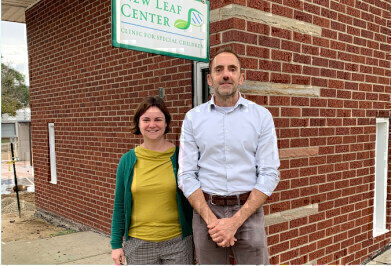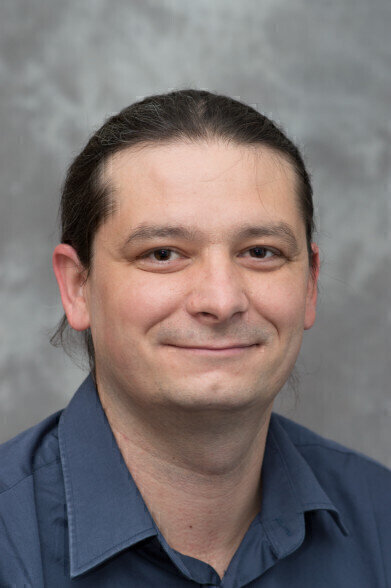-
 Andrew Crosby and Emma Baple (credit: University of Exeter)
Andrew Crosby and Emma Baple (credit: University of Exeter) -
 Julien Prudent (Credit: Julien Prudent/University of Cambridge)
Julien Prudent (Credit: Julien Prudent/University of Cambridge)
News
Gene Discovery Supports Research on MND Development
Jun 20 2022
A team led by Professor Andrew Crosby and Dr Emma Baple, University of Exeter, has developed a hypothesis to explain a common cause of motor neurone degenerative diseases (MNDs), stemming from their discovery of 15 genes responsible for different forms of MNDs. The genes are all involved in processing lipids - in particular cholesterol – inside brain cells and their work describes the specific lipid pathways that the team believe are important in disease development.
Their identification of a further new gene, named -‘TMEM63C’ – which causes a degenerative disease affecting the upper motor neurone cells in the nervous system, adds weight to the hypothesis that MNDs are caused by abnormal lipid(fat) processing, as it is located in the region of the cell where the lipid processing pathways that have been identified operate.
Professor Andrew Crosby, said: “We’re extremely excited by this new gene finding, as it is consistent with our hypothesis that the correct maintenance of specific lipid processing pathways is crucial for the way brain cells function, and that abnormalities in these pathways are a common linking theme in motor neurone degenerative diseases. It also enables new diagnoses and answers to be readily provided for families affected by some forms of MND”
If confirmed findings could lead to the use of patient samples to predict the course and severity of the condition in an individual and to monitor the effect of potential new drugs.
Using genetic sequencing techniques to investigate the genome of three families with individuals affected by hereditary spastic paraplegia – a large group of MNDs affecting motor neurons in the upper part of the spinal cord – the recent studies showed that changes in the TMEM63C gene were the cause of the disease. In collaboration with a group led by Dr Julien Prudent at the Medical Research Council Mitochondrial Biology Unit at the University of Cambridge, the team also undertook studies to learn more about the functional relevance of the TMEM63C protein inside the cell.
Using state-of-the-art microscopy methods, the Cambridge team’s work showed that a subset of TMEM63C is localised at the interface between two critical cellular organelles, the endoplasmic reticulum and the mitochondria, a region of the cell required for lipid metabolism homeostasis and proposed by the Exeter team to be important for the development of MNDs.
In addition to this specific localisation, Dr Luis-Carlos Tabara Rodriguez, a Postdoctoral Fellow in Dr. Prudent’s lab, also uncovered that TMEM63C controls the morphology of both the endoplasmic reticulum and mitochondria, which may reflect its role in the regulation of the functions of these organelles, including lipid metabolism homeostasis.
Dr Julien Prudent, of the MRC Mitochondrial Biology unit, said: “From a mitochondrial cell biologist point of view, identification of TMEM63C as a new motor neurone degenerative disease gene and its importance to different organelle functions reinforce the idea that the capacity of different cellular compartments to communicate together, by exchanging lipids for example, is critical to ensure cellular homeostasis required to prevent disease.”
The Halpin Trust, a charity supporting projects in healthcare, nature conservation and the environment, part-funded this research. Claire Halpin, the charities' co-founder with her husband Les said “The Halpin Trust are extremely proud of the work ongoing in Exeter, and the important findings of this highly collaborative international study. We’re delighted that the Trust has contributed to this work, which forms part of Les’s legacy. He would also have been pleased, I know.”
The new study, ‘TMEM63C mutations cause mitochondrial morphology defects and underlie hereditary spastic paraplegia’, is published in Brain.
More information online
Digital Edition
Lab Asia Dec 2025
December 2025
Chromatography Articles- Cutting-edge sample preparation tools help laboratories to stay ahead of the curveMass Spectrometry & Spectroscopy Articles- Unlocking the complexity of metabolomics: Pushi...
View all digital editions
Events
Jan 21 2026 Tokyo, Japan
Jan 28 2026 Tokyo, Japan
Jan 29 2026 New Delhi, India
Feb 07 2026 Boston, MA, USA
Asia Pharma Expo/Asia Lab Expo
Feb 12 2026 Dhaka, Bangladesh


















